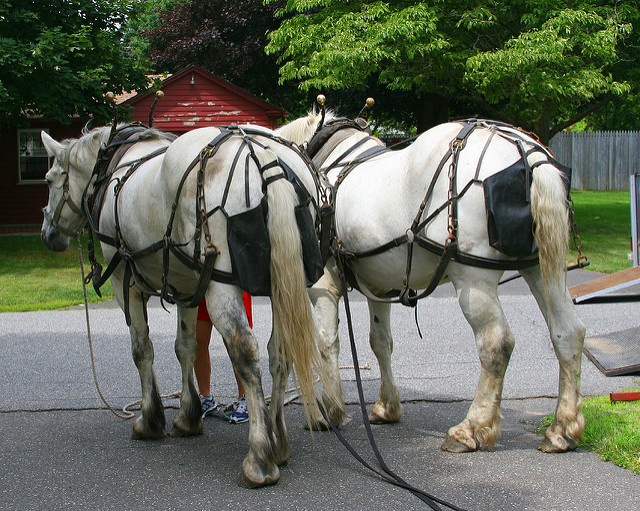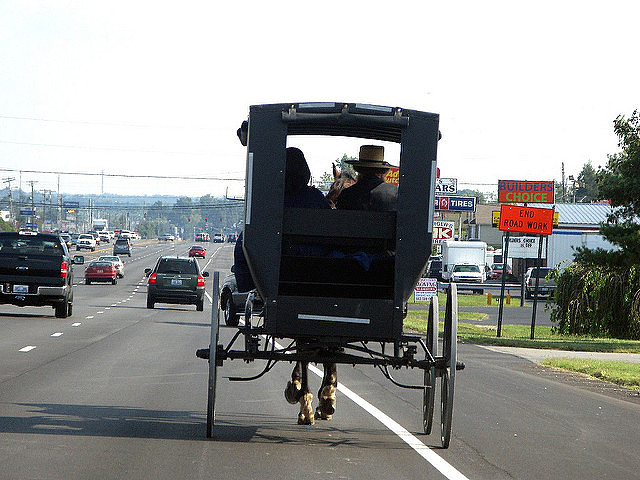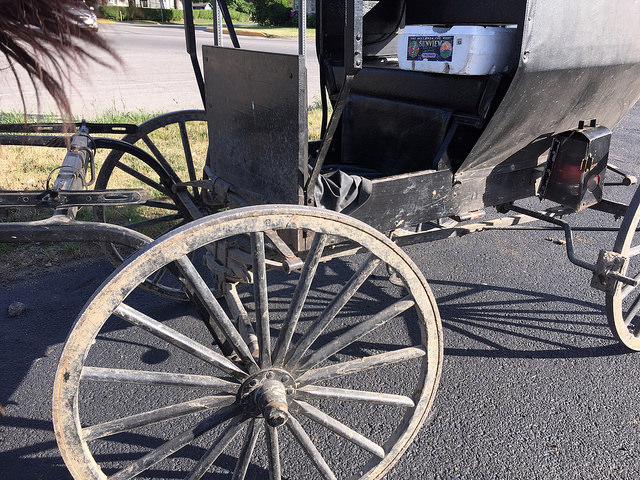Over a dozen Amish men are scheduled to appear in a Logan County, Kentucky, court on August 2, 2017, for ignoring a local ordinance requiring diapers on their horses.

An article last week in the News-Democrat & Leader of Russellville, the county seat of Logan County, described the refusal of some Amish to put the collection devices on their horses when they drive their buggies through the city of Auburn, Kentucky, and their obstinate refusal to pay fines imposed by the county when they violate that local law. The newspaper article said that the Swartzentruber Amish group had broken the local ordinance before—dozens of times, in fact. For instance, Amos Mast and his son Dan Mast have already spent ten days in jail for refusing to pay fines that were levied on them for their obstinacy.
The 13 Amish people facing 37 charges against them in August had just appeared in District Court with their attorney, Travis Locke. He said that he will be requesting separate trials for each of the offenses, but Joe Ross, the County Attorney, who will be the prosecutor, will argue that they should be tried together.

Residents of Auburn have evidently been complaining about droppings from Amish horses for several years. Complaints have included concerns for such issues as the safety of pedestrians who might step on the piles in crosswalks, manure that might stick to vehicle tires, and odors produced by the horse poop. The complaints prompted the Amish to reach handshake deals with the city to clean up after their horses. But evidently they didn’t clean up effectively enough, for the City Council then passed an ordinance requiring large animals to wear the diapers.
Two Amish men, Dan Mast and Emanuel Miller, attempted to overturn the city ordinance with a federal law suit in December 2016 but they subsequently withdrew it in order to avoid more publicity. According to another news report on the upcoming trial, the Amish argue that the diapers required for their horses violate their religious beliefs. The city responds that its ordinance is intended to protect public safety.

The action in Logan County, Kentucky, is just the latest in a continuing series of anti-Amish ordinances in small towns and cities of the U.S. that have been reported in this website, several of which have dealt with their horse culture. A news story in September 2006 reported that the county commissioners in Wayne County, Indiana, considered an ordinance that would have prohibited Amish buggies with steel wheels from driving on county roads due to the supposed damage they cause. After an outcry from local citizens, the commissioners found a face-saving way to abandon the proposal.
Similarly, a report from August 2010 indicated that the citizens of Viroqua, Wisconsin, were complaining about horse manure on their city streets. At a meeting of the city council, a proposal to require diapers on horses was considered. Amish representatives offered to not come into the community—to take their business elsewhere since they didn’t want to cause trouble. The mayor asked that they try to clean up after their horses. Experiences in other communities that have enacted horse diaper ordinances have shown that the diapers sometimes cause the horses to spook, which is a dangerous situation.

An article in October 2014 indicated that the Mayor and the City Manager of Brown City, Michigan, along with other residents, had been complaining about both horse droppings and the damage supposedly caused by steel wheels to the paved streets of their town. And several reports concerned the refusal of some Amish, particularly the Swartzentrubers, to put slow-moving vehicle triangles on the backs of their buggies.
Not all of the anti-Amish issues have focused on their horses. For instance, in May 2009 a judge in Cambria County, Pennsylvania, evicted some Amish families from their homes because they had not followed local regulations concerning the proper installation of their outhouses.

Of course, not all communities try to find ways to hassle or exclude the Amish. A farming community in the State of Maine was delighted to welcome Amish newcomers in 2011, and other communities have been similarly welcoming. Many people in U.S. towns are not bothered by the differences the Amish represent and they enjoy the peaceful spirit the newcomers bring to their communities, as the Mainers seem to do.